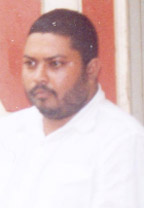The state has withdrawn its appeal in the Barry Dataram extradition hearing almost a year after it began fighting against a High Court ruling which had set him free.

The matter was scheduled for hearing yesterday at the Court of Appeal, but Attorney General Charles Ramson signed a notice of discontinuance last Thursday. The High Court ruling had exposed a lacuna in the local law and also stalled attempts to extradite Dataram.
Vic Puran, who represents Dataram, told Stabroek News yesterday that the withdrawal was likely because there could be no appeal in a criminal matter. Puran had argued previously raised concerns about the right to appeal in this case.
In the wake of the Dataram case government had announced that it would modify the law, and last month it passed an amendment to the Fugitive Offenders Act 1988 to address the conflict that arose within the law regarding individuals here being extradited. The amendment also controversially included a provision which empowers the Home Affairs Minister to decide whether to extradite or not.
The United States is seeking Dataram for cocaine smuggling offences, but has been unable to secure his provisional arrest because the extradition treaty between Guyana and the US contains a proviso which allows the US to extradite to third countries, clashing with the provisions of the Fugitive Offenders Act, which says “no one shall be extradited or kept in custody for the purpose of extradition from Guyana to another country unless provision has been made by that Commonwealth or treaty-country for ensuring that they would not be extradited to a third country for trial of any offence without the consent of the minister.” As a result, extraditions to the US have been on hold awaiting a new agreement or an amendment of the law.
Ramson, who moved the recent bill in Parliament, said during the debate that the amendments represent a suitable formula which was worked out following extensive internal consultations as the administration considered it critical to have some residual discretion lie within the power of the subject minister. “….this government is not trying to give some reason for a man like Dataram to have escaped,” he added, while insisting that the amendments have modernized the law.
He disclosed also that Dataram has left the country. “Here we are nearly one year after when Dataram has already flown the coop, as I am advised. And who would blame him? Had we been in the same position we might have flown the coop too,” Ramson said.
Dataram came up on the radar after the kidnapping of his wife, Sheleza, and their three-year-old daughter in December 2007 by two Venezuelans, one of whom was later shot dead in a confrontation with the police.
Dataram was then arrested and had been detained by police beyond the 72 hours that the law allows a person to be held in custody before being charged. His lawyers subsequently approached the court with a habeas corpus writ but police asked for an extension to conclude their investigation into the kidnapping, which they said was drug-related.
What followed was a series of court appearances during which Dataram was twice set free and rearrested. He was finally set free in December last year when he had appeared before the current attorney general who was a judge at the time.



